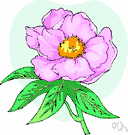bloom 1
(blo͞om)n.
1.
a. The flower of a plant.
b. Something resembling the flower of a plant: "Her hair was caught all to one side in a great bloom of frizz" (Anne Tyler).
2.
a. The condition of being in flower: a rose in full bloom.
b. A condition or time of vigor and beauty; prime: "the radiant bloom of Greek genius" (Edith Hamilton).
3. A fresh, rosy complexion: "She was short, plump, and fair, with a fine bloom" (Jane Austen).
4.
a. A waxy or powdery whitish to bluish coating on the surface of certain plant parts, as on cabbage leaves or on a plum or grape.
b. A similar coating, as on newly minted coins.
c. Grayish blotches or streaks on the surface of chocolate produced by the formation of cocoa butter crystals.
d. Chemistry See efflorescence.
5. Glare that is caused by a shiny object reflecting too much light into a camera.
6. A colored area on the surface of a body of water caused by large numbers of phytoplankton, especially cyanobacteria.
v. bloomed, bloom·ing, blooms
v.intr.
1.
a. To bear a flower or flowers.
b. To support plant life in abundance: rains that made the yard bloom.
2. To glow; be radiant: "Our summer-gray potbellied stove bloomed rosy red during winter" (Maya Angelou).
3. To mature or flourish with youth and vigor: genius blooming under a great teacher.
4. To appear or come into being suddenly: "Her pale shoulders bloomed from the green flounces" (Erin McGraw).
v.tr.
1. To cause to flourish.
2. Obsolete To cause to flower.
bloom′y adj.
Synonyms: bloom1, blossom, efflorescence, florescence, flower, flush1, prime
These nouns denote a condition or time of greatest vigor and freshness: beauty in full bloom; the blossom of a great romance; the efflorescence of Russian literature; the florescence of Greek civilization; in the flower of youthful enthusiasm; in the flush of their success; the prime of life.
These nouns denote a condition or time of greatest vigor and freshness: beauty in full bloom; the blossom of a great romance; the efflorescence of Russian literature; the florescence of Greek civilization; in the flower of youthful enthusiasm; in the flush of their success; the prime of life.
bloom 2
(blo͞om)n.
1. A bar of steel prepared for rolling.
2. A mass of wrought iron ready for further working.
American Heritage® Dictionary of the English Language, Fifth Edition. Copyright © 2016 by Houghton Mifflin Harcourt Publishing Company. Published by Houghton Mifflin Harcourt Publishing Company. All rights reserved.
bloom
(bluːm)n
1. a blossom on a flowering plant; a flower
2. the state, time, or period when flowers open (esp in the phrases in bloom, in full bloom)
3. open flowers collectively: a tree covered with bloom.
4. a healthy, vigorous, or flourishing condition; prime (esp in the phrase the bloom of youth)
5. youthful or healthy rosiness in the cheeks or face; glow
6. (Botany) a fine whitish coating on the surface of fruits, leaves, etc, consisting of minute grains of a waxy substance
7. any coating similar in appearance, such as that on new coins
8. (Biology) ecology a visible increase in the algal constituent of plankton, which may be seasonal or due to excessive organic pollution
9. (Building) Also called: chill a dull area formed on the surface of gloss paint, lacquer, or varnish
vb (mainly intr)
10. (of flowers) to open; come into flower
11. to bear flowers; blossom
12. to flourish or grow
13. to be in a healthy, glowing, or flourishing condition
14. (General Physics) (tr) physics to coat (a lens) with a thin layer of a substance, often magnesium fluoride, to eliminate surface reflection
[C13: of Germanic origin; compare Old Norse blōm flower, Old High German bluomo, Middle Dutch bloeme; see blow3]
bloom
(bluːm)n
(Metallurgy) a rectangular mass of metal obtained by rolling or forging a cast ingot. See also billet12
vb
(Metallurgy) (tr) to convert (an ingot) into a bloom by rolling or forging
[Old English blōma lump of metal]
Collins English Dictionary – Complete and Unabridged, 12th Edition 2014 © HarperCollins Publishers 1991, 1994, 1998, 2000, 2003, 2006, 2007, 2009, 2011, 2014
bloom1
(blum)n.
1. the flower of a plant.
2. flowers collectively, as of a plant or tree.
3. the state of flowering: lilacs in bloom.
4. a flourishing, healthy condition; the time of greatest beauty, vigor, or freshness: the bloom of youth.
5. a glowing or glossiness indicative of health, vigor, or youth, esp. a flush on the cheek.
6. a whitish, powdery coating on the surface of certain fruits, as the grape, or some leaves.
7. any similar surface coating or appearance, as on newly minted coins or on rocks or minerals.
8. a clouded or dull area on a varnished or lacquered surface.
9. the sudden development of conspicuous masses of organisms, as algae on the surface of a lake.
v.i. 10. to produce or yield blossoms.
11. to thrive.
12. to be in or achieve a state of healthful beauty and vigor.
13. to glow with warmth or with a warm color.
v.t. 14. to cause to yield blossoms.
15. to make bloom or give bloom to.
[1150–1200; Middle English blom, blome < Old Norse blōm(i)]
bloom′less, adj.
bloom2
(blum)n.
1. a piece of steel, square or slightly oblong in section, reduced from an ingot to dimensions suitable for further rolling.
2. a large lump of iron and slag, of pasty consistency when hot, hammered into wrought iron.
[before 1000; representing Anglo-Latin, Anglo-French blomes (pl.), Old English blōma mass of iron; perhaps akin to bloom1]
Random House Kernerman Webster's College Dictionary, © 2010 K Dictionaries Ltd. Copyright 2005, 1997, 1991 by Random House, Inc. All rights reserved.
bloom
Past participle: bloomed
Gerund: blooming
| Imperative |
|---|
| bloom |
| bloom |
Collins English Verb Tables © HarperCollins Publishers 2011
ThesaurusAntonymsRelated WordsSynonymsLegend:
| Noun | 1. | bloom - the organic process of bearing flowers; "you will stop all bloom if you let the flowers go to seed" biological process, organic process - a process occurring in living organisms |
| 2. |  bloom - reproductive organ of angiosperm plants especially one having showy or colorful parts bloom - reproductive organ of angiosperm plants especially one having showy or colorful partsangiosperm, flowering plant - plants having seeds in a closed ovary apetalous flower - flower having no petals inflorescence - the flowering part of a plant or arrangement of flowers on a stalk ray floret, ray flower - small flower with a flat strap-shaped corolla usually occupying the peripheral rings of a composite flower bud - a partially opened flower stamen - the male reproductive organ of a flower reproductive structure - the parts of a plant involved in its reproduction pistil - the female ovule-bearing part of a flower composed of ovary and style and stigma carpel - a simple pistil or one element of a compound pistil ovary - the organ that bears the ovules of a flower floral leaf - a modified leaf that is part of a flower chlamys, floral envelope, perianth, perigone, perigonium - collective term for the outer parts of a flower consisting of the calyx and corolla and enclosing the stamens and pistils chrysanthemum - the flower of a chrysanthemum plant | |
| 3. | bloom - the best time of youth time of life - a period of time during which a person is normally in a particular life state youth - the time of life between childhood and maturity | |
| 4. |  bloom - a rosy color (especially in the cheeks) taken as a sign of good health bloom - a rosy color (especially in the cheeks) taken as a sign of good healthgood health, healthiness - the state of being vigorous and free from bodily or mental disease | |
| 5. | bloom - the period of greatest prosperity or productivity period, period of time, time period - an amount of time; "a time period of 30 years"; "hastened the period of time of his recovery"; "Picasso's blue period" golden age - a time period when some activity or skill was at its peak; "it was the golden age of cinema" | |
| 6. | bloom - a powdery deposit on a surface | |
| Verb | 1. | bloom - produce or yield flowers; "The cherry tree bloomed" develop - grow, progress, unfold, or evolve through a process of evolution, natural growth, differentiation, or a conducive environment; "A flower developed on the branch"; "The country developed into a mighty superpower"; "The embryo develops into a fetus"; "This situation has developed over a long time" effloresce, burst forth - come into or as if into flower; "These manifestations effloresced in the past" |
Based on WordNet 3.0, Farlex clipart collection. © 2003-2012 Princeton University, Farlex Inc.
bloom
noun
2. prime, flower, beauty, height, peak, flourishing, maturity, perfection, best days, heyday, zenith, full flowering in the full bloom of youth
verb
Collins Thesaurus of the English Language – Complete and Unabridged 2nd Edition. 2002 © HarperCollins Publishers 1995, 2002
bloom 1
noun2. A condition or time of vigor and freshness:
1. To bear flowers:
bloom 2
nounThe American Heritage® Roget's Thesaurus. Copyright © 2013, 2014 by Houghton Mifflin Harcourt Publishing Company. Published by Houghton Mifflin Harcourt Publishing Company. All rights reserved.
Translations
إِزْهارٌزَهْرَةٌ، نَوْرَةٌنَضارَةٌيُزْهِرُ، يُنَوِّرُ
květkvětinarozkvětrozkvétata
blomstblomstreblomstring
kukintakukkia
ifjúsága teljében
blómblómatímiblómi, blómatímiblómstra
verno
pats žydėjimasžiedasžydėjimasžydėti
plauktplaukumsziedēšanaziedētzieds
rozkvet
cveteti
bloom
[bluːm]Collins Spanish Dictionary - Complete and Unabridged 8th Edition 2005 © William Collins Sons & Co. Ltd. 1971, 1988 © HarperCollins Publishers 1992, 1993, 1996, 1997, 2000, 2003, 2005
Collins English/French Electronic Resource. © HarperCollins Publishers 2005
bloom
n
→ Blüte f; to be in (full) bloom → in (voller) Blüte stehen; to come/burst into bloom → aufblühen/plötzlich erblühen
vi (lit, fig) → blühen
Collins German Dictionary – Complete and Unabridged 7th Edition 2005. © William Collins Sons & Co. Ltd. 1980 © HarperCollins Publishers 1991, 1997, 1999, 2004, 2005, 2007
bloom
[bluːm]1. n (flower) → fiore m; (on fruit) → lanugine f; (on complexion) → colorito roseo
in bloom (flower) → sbocciato/a (tree) → in fiore
in full bloom → in piena fioritura
in the full bloom of youth → nel fiore della giovinezza
in bloom (flower) → sbocciato/a (tree) → in fiore
in full bloom → in piena fioritura
in the full bloom of youth → nel fiore della giovinezza
Collins Italian Dictionary 1st Edition © HarperCollins Publishers 1995
bloom
(bluːm) noun1. a flower. These blooms are withering now.
2. the state of flowering. The flowers are in bloom.
3. freshness. in the bloom of youth.
verb to flower or flourish. Daffodils bloom in the spring.
Kernerman English Multilingual Dictionary © 2006-2013 K Dictionaries Ltd.